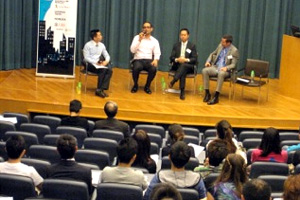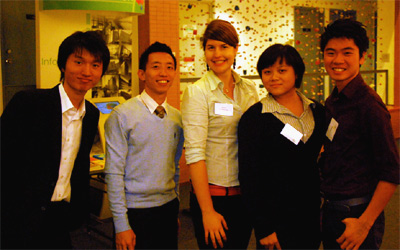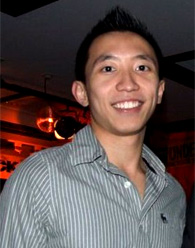Readers will perhaps recall that I have written two articles over the last four months describing how some of the major players of Hong Kong’s commercial world have been slowly but surely coming out of the closet to embrace LGBT diversity. One more step forward along this road was taken by a group of business titans on Tuesday 2 November at the University of Hong Kong (HKU), where the student group Queer Straight Alliance (QSA) held the first ever Inclusion Recruitment Conference to take place in a Hong Kong university.

The brain child of QSA’s leading member, Michael Lam, who is a graduate student at HKU, the conference aimed to bring students from all universities in Hong Kong (though in effect almost all the 110 who registered were from HKU) face to face with human resources and diversity managers from the business world. The big names present, which not only sent their staff to meet prospective student candidates but also paid jointly for the event, were Bank of America Merrill Lynch, Goldman Sachs, Hong Kong Disneyland, Nomura and UBS. All these companies set up booths outside the conference hall in the Graduate House and manned them with senior staff to meet the students between sessions. This was something of a first in itself, though it has to be said that individual banks have earlier, and privately, held recruiting sessions aimed at LGBT students here. The fact that they were all happy that their efforts be publicised was also in itself an advance. The days when commerce here was shy of its own diversity achievements are gradually being left behind.
The day-long event was organised around three panel sessions, each with panellists well known in Hong Kong and in regional business. Hong Kong gay activist Roddy Shaw chaired the first session on inclusion in recruitment. He moderated a discussion between Rosalind Coffey, Managing Director, Human Resources, Nomura; Shalini Mahtani MBE, founder of the NGO Community Business and the force behind her organisation’s link up with Goldman Sachs and IBM in the business diversity project they jointly launched here this June; and Goki Muthusamy, Head of Diversity and Inclusion, Asia Pacific, for Bank of America Merrill Lynch. Business, they all concluded, wanted diversity for the creativity it brought. Thinking along single lines and inside boxes was the road to eventual commercial ruin and diversity was good for competition. The hard-nosed business case is running in the LGBT direction.
Why are employers bothered with inclusion in their workplaces?
The centrepiece of the programme was a discussion on inclusion in the workplace. Led by Michael Lam, the panel consisted of Greg Morley, Director, Staffing, Compensation, Benefits and HRIS at Hong Kong Disney Resort; Anshuman Das, Co-chair, LGBT Pride Group, Asia Pacific, Bank of America Merrill Lynch; and Paul Choi, Executive Director – Human Capital Management at Goldman Sachs. Why are employers bothered with inclusion in their workplaces? The panel was sure that they must be. Greg Morley gave the most succinct answer: His company seeks “people who bring not only their talent but their heart to work.” And fostering diversity in the workplace gives employees that heart. How many of them does it affect? Paul Choi gave Goldman’s own answer, culled from the results of their own most recent voluntary internal survey, which found that 5% of their employees self-identified as LGBT. Kinsey’s estimations were not so different all those years ago.

Organising committee of the Inclusion Recruitment Conference,
from left: Dingle, Michael Lam, Lisa, Venus and Jason
Affecting change – as incremental as it might be
The final panel of the day focussed on inclusion in legislation (basically, where we are in the struggle for a bill against discrimination on the grounds of sexual orientation and gender identity). Michael Lam led again, this time bringing together Michael Vidler, Hong Kong’s leading human rights solicitor; Farzana Aslam, a barrister and teaching consultant at HKU; Jennifer Yates, Head of Employee Relations, APAC, for UBS; and this correspondent, representing both Fridae.com and Hong Kong’s Tongzhi Community Joint Meeting (TCJM), of which I am the Joint English Secretary. Incremental change – in all sectors: legal, commercial, social and political – was the way to overcome Hong Kong Government’s intransigent refusal to legislate until a ‘public consensus’ had been reached, the panel thought. How to reach this consensus? Not, perhaps, by an unlikely direct political assault or by ever-so-slowly trying to change the majority view in Hong Kong, but by bringing pressure to bear on the opinion formers and power brokers and making it sensible or convenient for them to shift their stance. Here business would play a crucial part, the panel felt. The buttresses of the dam holding up change could be undermined from the sides.
I met Michael Lam over coffee and sandwiches at the lunch break to find out about the background to the day. Lam is well known to me through his work as one of the TCJM’s Campaign Officers. The conference had grown, he told me, from the smaller recruiting events held earlier at HKU by individual corporations. These had been discreet and not supported by the university, but they had given Lam and his team (another prominent member of which is Venus Tsang, who is herself a committee member of the TCJM) the idea of what could be achieved. He himself had been behind not only this event but also the mentor programme QSA is running jointly with Fruit in Suits, in which figures in the business community formally mentor Hong Kong LGBT students for a period of just under a year.

Lam was born in Hong Kong and left to study in England at the age of 15. He was there for seven years, which culminated in a degree in law at Warwick University, then came home to Hong Kong to carry on his studies at HKU. He’s now there reading for a master’s degree in law, studying the effect on Hong Kong’s LGBT population of the recent extension of the Domestic Violence Ordinance to cover same-sex couples. He’s got an online survey running at the moment on this subject, so if you’re a Hong Kong resident you might like to fill it in – in Chinese or English.
Queer Straight Alliance not recognised by university or student union
I asked him to tell me about the QSA. “It began in 2002 as HKqUeer Campus, the first LGBT students group at the university, set up by Eleanor Cheung, Ambrose Ng and a few others,” These handed over to a second generation of leaders, Jason Chiu and Venus Tsang and now Lam himself, and the new brooms renamed it QSA in 2009. Its membership is almost entirely still HKU students, though it’s open to those of other universities in Hong Kong, none of which have similar bodies for their LGBT students.
“We don’t get help or even recognition from the university, not even from the student union, which refuses even to talk to us”, Michael added, “so the sponsorship and money for all our activities we have to raise ourselves”. For this conference, for instance, the QSA was on its own. However, all is not so bleak at HKU, and the Post Graduate Students Association proved more inclusive than its undergraduate counterpart and publicly supported the event. As did HKU’s CEDARS organisation, the Centre for Development of Resources for Students, one of whose leading members, clinical psychologist Dr Eugenie Y Leung, attended the event.
HKU is still, it would appear, in something of a no man’s land as regards inclusion. Much of its liberal ethos has enabled staff to run programmes and research with LGBT themes and the HKU Press is now well into publishing an increasingly important series of books on queer subjects. Yet an organisation like QSA has to fight for its existence unaided inside the university and there are academic staff there who are too shy or frightened to come out or even attend a public event such as this. Inclusion is a subject at which the university authorities might well be encouraged to have a closer look.
Lam and his fellow in QSA, though, are in no way discouraged. Their conference slogan was ‘The Sky’s Your Limit’. They’re reaching for it themselves.
